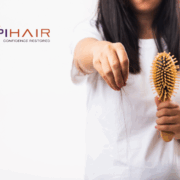Medical Reasons For Hair Loss In Women in Nolensville, TN
Restore your confidence with effective hair loss solutions for women.
Hair loss in women can be a distressing experience, impacting self-esteem and confidence. While it’s often associated with men, women also experience hair thinning and baldness due to various medical reasons. Understanding the underlying causes and available treatment options is crucial in addressing this concern.
Hair Growth Cycle
The human hair growth cycle consists of three phases: anagen (active growth), catagen (transition), and telogen (resting). Each hair follicle operates independently, which means various factors can affect the growth cycle of different hairs on the scalp.
Medical Reasons for Hair Loss in Women
Hair loss in women can be attributed to several medical conditions and factors, some of which are outlined below:
Hormonal Imbalance
Hormonal imbalances, such as those related to thyroid disorders, menopause, and polycystic ovary syndrome (PCOS), can contribute to hair loss in women. Fluctuating hormone levels can disrupt the hair growth cycle, leading to thinning and shedding of hair.
Nutritional Deficiencies
Nutritional deficiencies, particularly in iron, vitamin D, and protein, can significantly impact hair health. Women who follow restrictive diets or have poor eating habits may experience hair loss due to inadequate nutrient intake.
Stress and Telogen Effluvium
Severe emotional or physical stress can trigger a condition called telogen effluvium, causing an increased number of hair follicles to enter the resting phase simultaneously. This may lead to noticeable hair shedding and thinning.
Medical Conditions
Certain medical conditions, such as alopecia areata, lupus, and trichotillomania, can directly affect the hair follicles, resulting in patchy hair loss or overall thinning across the scalp. Seek medical attention if you suspect you have any of these conditions.
Medication and Treatment Side Effects
Some medications and treatments, including chemotherapy, radiation therapy, and certain drugs used for chronic conditions, can lead to hair loss as a side effect. Discuss potential side effects with your healthcare provider before starting any new medications.
Genetic Predisposition
Female pattern hair loss, also known as androgenetic alopecia, can occur due to genetic predisposition. This type of hair loss usually results in gradual thinning at the crown and frontal scalp areas.
Autoimmune Disorders
Autoimmune disorders, such as alopecia areata, involve the immune system mistakenly attacking the hair follicles, leading to hair loss. Seeking early intervention from a healthcare professional is essential to manage autoimmune-related hair loss effectively.
Pregnancy and Postpartum Period
Pregnancy and the postpartum period can result in temporary hair loss due to hormonal fluctuations. This condition, known as postpartum alopecia, often resolves within several months to a year after delivery.
End thoughts
Acknowledging the medical reasons for hair loss in women is crucial for effectively addressing this concern. Whether it’s hormonal imbalances, nutritional deficiencies, stress, or genetic predispositions, identifying the underlying cause is the first step towards finding suitable treatment options. If you’re experiencing hair loss, consult with a healthcare professional to determine the specific cause and explore personalized solutions to promote hair regrowth and overall scalp health.














